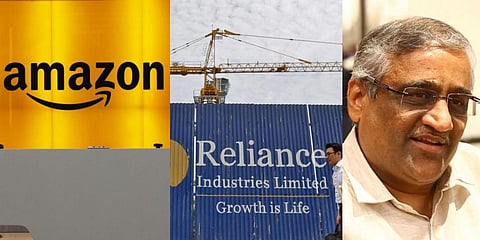

Amazon has to still get used to the street-fighting ways in India. From the night of 25 February last month, Reliance Retail staff in the dead of night began entering Big Bazaar stores and outlets all over the country belonging to Kishore Biyani’s Future Retail Group. Overnight, hundreds of Future Group’s retail assets were ‘seized’ and rebranded.
Amazon has been in a see-saw litigation with the Future Group and Reliance since 2020, and has so far blocked the R24,500 crore sale of Future’s retail chain to Reliance. But it had not bargained for the forcible seizure of Future’s assets. Reliance says it has taken over the stores after Future failed to pay rentals for years, and it is merely taking back its properties after cancelling the sub-leases for default. Two Future Group companies had confirmed to the bourses that they had indeed received termination notices for 893 leased outlets. But is it a bilateral deal or a forced takeover? The cloak-and-dagger operation buttressed perception that Mukesh Ambani’s Reliance, in conjunction with Future, was taking a bypass route to acquire the latter’s assets.
If the stores are transferred to Reliance, there will be nothing for Amazon to fight for, Amazon’s lawyer Aspi Chinoy admitted frankly in court on Tuesday. But the shocker came the next day, when Future’s Biyani told the apex court that Reliance’s takeover was ‘drastic and unilateral’ and that he was committed to reverse the seizure of his outlets and “seek value adjustments”.
If the ‘takeover’ of hundreds of stores did not have Future Retail’s permission, and was not done by due process of law, doesn’t it amount to forcible seizure of property? And isn’t it a criminal offense? There’s a legal process to cancel a lease agreement, and it cannot be unilateral. What exactly is going on?
High stakes
It’s a battle of the Goliaths. Amazon, the world’s biggest retailer with an annual revenue of $470 billion, came to India in 2013, and in less than a decade has created a huge digital marketplace. Reliance Retail, started earlier in 2006, and is the largest Indian retailer with revenues of over $22 billion a year. Over time, the Mukesh Ambani group has moved from its legacy business of oil and gas to retailing and telecom as its main focus. In this battle of the biggies, Kishore Biyani – the second biggest retailer and the man who built up the organised retail footprint with brands such as Big Bazaar, Pantaloon and E Zone – is sandwiched and bleeding, and is seeking an exit.
The roots of the dispute go back to 2019, when Future, seeking to survive, partnered Amazon with the US multinational investing $200 million in a Future Group company. The deal also included several non-compete clauses that prevented Future from selling out to Amazon rivals including Reliance Retail.
However, war broke out soon between the two sides when Future, hit by the Covid-19 pandemic, decided to sell its retail businesses to Reliance Retail in October 2020 for R24,500 crore. Amazon approached the Singapore Arbitration Tribunal, and had the sale stayed. Since then, the two sides have been involved in scorching litigation in Indian courts, with Future claiming the seat of arbitration is not Singapore, but New Delhi. There are high stakes involved. Amazon says the agreements it signed in 2019 with Future gave it special rights over Future’s retail assets, and some of these would come to Amazon once rules for foreign investment in retail are eased. If the Future-Reliance deal goes through, Amazon’s entire business plan would be at risk. On the other hand, for Reliance, the merger of its 1,100 supermarkets with Future’s 1,500 stores network, would make its market position unassailable. Up for grabs is a $900 billion retail market, with 1.3 billion consumers.
Strange transfer of assets
The whirlpool of litigation will go on. Amazon and Future have both told the apex court its attempts at negotiating an agreement, allowed on 3 March by the court, had fallen through. The Supreme Court has meanwhile lifted a 5 January stay by the Delhi Hight Court on the Singapore Arbitration Tribunal Centre (SIAC) hearing the Amazon-Future Group dispute.
Some things are obvious to those who want to see it. It is difficult to imagine how such a large operation of taking over hundreds of Future’s stores could have been planned and executed without the Future Group’s nod. On the ground, there was no resistance. There does not seem to be any intervention by the police machinery either. Reliance is too big and too powerful for Amazon. It has state support too. The Mukesh Ambani conglomerate has already taken over one-third or close to 950 stores. The remaining 550 too will be passed on in the coming days. It appears what Amazon is saying is true: very soon the litigation over Future’s assets will be purely academic as Reliance gobbles up the prize through side deals.Can Amazon win in the long run? Perhaps, yes. It has deeper pockets, better technology and a huge advantage on the digital marketing formats.
Reliance too powerful for Amazon
The Mukesh Ambani conglomerate has already taken over one-third or close to 950 stores. The remaining 550 too will be passed on in the coming days. If the stores are transferred to Reliance, there will be nothing for Amazon to fight for.